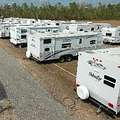 山巒協會(Sierra Club)宣布,其與美國聯邦災難防治署(Federal Emergency Management Agency, FEMA)的爭論已獲得部分勝利。兩方爭論是關於2005年因颶風卡崔娜與莉塔侵襲造成倖存者無家可歸,當時所提供的12萬輛移動式房屋與拖車當中,部分發現有毒性的甲醛。
山巒協會(Sierra Club)宣布,其與美國聯邦災難防治署(Federal Emergency Management Agency, FEMA)的爭論已獲得部分勝利。兩方爭論是關於2005年因颶風卡崔娜與莉塔侵襲造成倖存者無家可歸,當時所提供的12萬輛移動式房屋與拖車當中,部分發現有毒性的甲醛。
為回應山巒協會與其他組織公開地強烈反抗,聯邦災難防治署決定,重新評估繼續配給含有危險標準甲醛拖車之決策。
甲醛是一種用於油漆與黏著劑的化學物質,被國際癌症研究署歸類為「已知可致癌物質」。
山巒協會執行長波普(Carl Pope)於25日表示,住在拖車的居民與山巒協會已對聯邦災難防治署施壓,要求其承認拖車甲醛溢氣量的問題,並且在確認旅行居住車達安全標準之前,停止配給。
波普補充,「聯邦災難防治署配給的許多拖車當中,均發現有高度危險性的甲醛,而這已危害到許多居民的健康,甚至可能已造成數人死亡。」
The Sierra Club is declaring a partial victory in its fight with the Federal Emergency Management Agency, FEMA, over toxic formaldehyde found in some of the 120,000 mobile homes and travel trailers provided to hurricane survivors left homeless in 2005 by Katrina and Rita.
In response to a public outcry by the Sierra Club and others, FEMA has decided to re-evaluate its decision to continue distributing trailers known to have unsafe levels of formaldehyde.
Formaldehyde is a chemical used in paint and adhesives, and is classified as a "known carcinogen" by the International Agency for Research on Cancer.
Sierra Club Executive Director Carl Pope said today, "Trailer residents and the Sierra Club have been pressing the agency to acknowledge the problem of formaldehyde outgassing in the trailers and to stop distributing the trailers until the agency could ensure that all trailers going out were safe."
"Dangerously high levels of formaldehyde found in many FEMA trailers have caused serious health problems for many trailer residents and are even suspected as the cause of several deaths," Pope said.
全文及圖片詳見ENS





